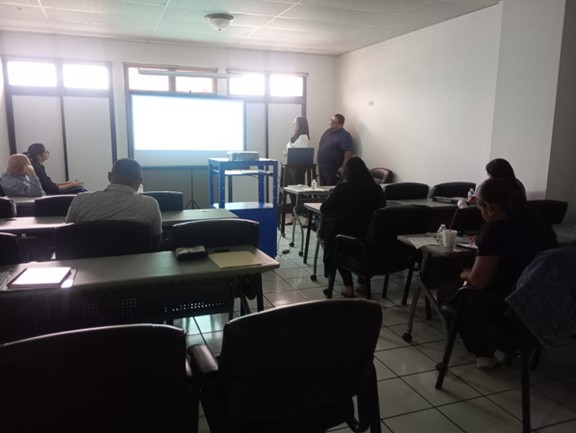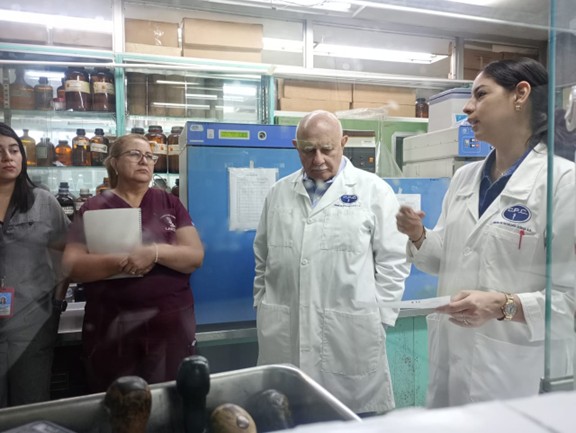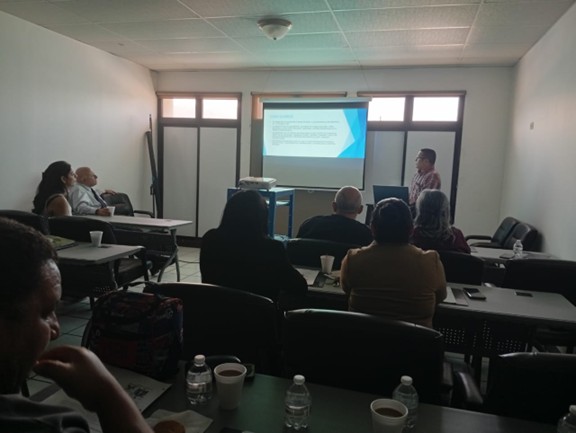Series of Theoretical–Practical Workshops on Sample Processing in the Bacteriology Laboratory of Hospital Escuela – Workshop 2, April–May 2025
Introduction
The Clinical Pathology Center (CPC), a national reference institution committed to excellence in medical care and clinical diagnostics, leads this initiative as part of its mission to provide high-quality diagnostic services, promote research, and foster continuous education. In collaboration with the Infectious Diseases Service, the Department of Internal Medicine, the Clinical Laboratory Department of Hospital Escuela, and the Institute of Infectious Diseases and Parasitology Antonio Vidal, and within the framework of The Global Health Network Latin America and the Caribbean (TGHN LAC) Consortium, a theoretical-practical workshop has been launched to update clinical laboratory personnel in applied clinical microbiology. In Year 2, this joint initiative seeks to strengthen the diagnostic capacities of the Bacteriology Laboratory of Hospital Escuela, reinforcing the foundations for infectious disease research and supporting clinical decision-making based on microbiological evidence.
General Objective
To review, through a theoretical-practical approach, the procedures for processing clinical samples in the bacteriology laboratory of Hospital Escuela, applying updated criteria for pathogen identification and antimicrobial resistance analysis.
Expected Results
This workshop aims to generate a positive change in the diagnostic capacity of Hospital Escuela through continuous training of technical staff, process systematization, and ongoing analysis of microbiological data. It also seeks to encourage teamwork, active participation, and commitment to quality in clinical diagnostics.
📅 Duration: February – October 2025
📍 Modality: In person
🏥 Participating institutions: Clinical Pathology Center (CPC), Hospital Escuela, and Instituto Antonio Vidal
⏰ Session schedule: Fridays, from 11:30 a.m. to 1:00 p.m. (every two weeks)
Workshop Components
🔬 1. Sample Processing Guide
Organized by systems and organs, this component addresses the diagnostic approach to different types of infections: urinary, respiratory, gastrointestinal, skin, nervous system, genital, among others. It includes specific instructions for the handling and culture of various types of samples such as blood, sterile fluids, urine, medical devices, and swabs.
📁 2. Clinical Case Presentations
Active participation of laboratory technicians is encouraged through the presentation of real cases, including clinical, microbiological, and therapeutic discussion. Each presentation includes clinical history, laboratory analysis, patient evolution, and diagnostic considerations.
👥 3. Supervision Visits to the Bacteriology Laboratory
With the participation of the CPC team, regular visits are conducted to observe, evaluate, and accompany processes carried out in the laboratory, identify opportunities for improvement, and strengthen good practices.
📝 4. Final Assignment
Participants will prepare an analytical report on the cultures processed over six months (March to August or April to September). The report will analyze frequencies by sample type, culture results, isolated species, and antimicrobial resistance patterns.
Resources
Workshop participants will have access to the following support resources to facilitate learning and documentation of progress:
- 🌐 The Global Health Network platform
- 🌍 The Global Health Network Latin America and the Caribbean
- 🦠 Thematic resource: Antimicrobial Resistance (AMR)
- 📘 Printed educational material with the content of each topic
- 📝 Attendance sheet
- 📜 Certificate of Participation (for those who complete the workshop requirements)
Workshop 2. Blood Cultures and Respiratory Tract Infections
April 2025
2.1 Diagnostic approach using blood culture
The session focused on the diagnosis of bloodstream infections through blood culture, beginning with the presentation and discussion of a clinical case by the Bacteriology Laboratory staff, which allowed for contextualizing its practical application.
Subsequently, the team from the Clinical Pathology Center (CPC) addressed key aspects for proper sample collection, including antisepsis, the recommended volume (40–80 ml), and timely transport to the laboratory. Automated monitoring systems (BACTEC, VersaTREK, BacT/ALERT), incubation conditions, and criteria for interpreting positive blood cultures were reviewed.
This session strengthened practical and technical learning, promoting good practices in the handling and interpretation of blood cultures.

Clinical case presentation on bloodstream infection during the blood culture workshop session.
May 2025
2.2 Technical visit for review of urine culture procedures
During this session, the team from the Clinical Pathology Center (CPC) conducted a technical visit to the Clinical Laboratory of Hospital Escuela to review and standardize the techniques used for urine culture processing.
Critical steps of the procedure were discussed, including sample quality, appropriate use of culture media, and microbiological criteria for result interpretation. The interaction allowed verification of current practices, identification of improvement opportunities, and reinforcement of compliance with quality standards in diagnostic microbiology.
This session promoted technical exchange between teams and strengthened the ongoing process of capacity-building in clinical microbiology at the laboratory.

Dr. Carlos Javier and Dr. Marcela Aguilar during the technical review of urine culture procedures.
2.3 Clinical case discussion and microbiological approach to respiratory tract infections
The session began with the presentation and analysis of a representative clinical case of lower respiratory tract infection, facilitating interdisciplinary discussion on diagnosis, empirical treatment, and microbiological correlation.
Next, the team from the Clinical Pathology Center (CPC) presented key principles for processing respiratory samples, such as sputum and bronchoalveolar lavage, emphasizing the importance of sample quality assessment, proper selection of culture media, and distinction between contaminant and pathogenic flora.
Interpretation criteria for Gram stains and cultures were reviewed in the context of clinical presentation, as well as common challenges in microorganism identification in chronic respiratory infections and immunocompromised patients.
This session strengthened the Clinical Laboratory team’s capacity in the microbiological diagnosis of respiratory infections, promoting informed decision-making and effective collaboration between the laboratory and treating clinical teams.

Clinical case presentation on respiratory tract infection during the workshop session.
Support the community
Thank you for visiting The Global Health Network, please take a moment to read this important message. As you know, our aim is to enable equity in access to research knowledge and this is successfully delivering support and training to 1000’s of research teams all over the world. But we need your support!. If you have benefited from this research skills and knowledge sharing facility, please help us sustain this remarkable and unique provision of information for those who could otherwise not access such support and training. We would be really grateful if you could make a donation or ask your employer or organisation to contribute to the costs of maintaining this platform and the generation of new contents for all users. Just a small contribution from everyone who can afford to pay would keep this available for those who cannot. Thank you, we really appreciate your part in this community effort to better equity in global health research.
